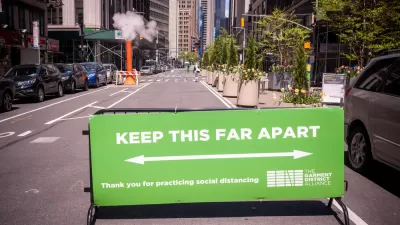The membership of decisionmaking bodies such as planning commissions rarely reflects the socioeconomic, gender, and racial characteristics of the local community.

Who is represented in planning decisions? “Land-use laws influence home prices, class and racial segregation, carbon emissions levels, and labor market efficiency,” making this a key question, write Lydia Lo, Eleanor Noble, Yonah Freemark in a new study for the Urban Institute.
The study analyzed “the racial and gender characteristics, housing tenures, and occupations of land-use decisionmaking board members across 482 jurisdictions and 601 land-use decisionmaking bodies within the 50 largest metropolitan areas in the United States.”
The study found that, by and large, “the people who draft, adjudicate, and implement land-use laws rarely share similar demographics, occupations, or housing tenures as their jurisdiction’s residents.”
The article details the data on representation, noting that “Forty-five percent of land-use boards have a membership that is at least 95 percent white, even though only 5 percent of jurisdictions have such high white population shares.” Additionally, men are overrepresented by more than 20 percentage points, while renters are underrepresented in 99 percent of jurisdictions. Planning and zoning board members also tend to come from planning- or real estate-related professions. “Meanwhile, there are few board members hailing from the food, health care, and retail sectors, and retirees, homemakers, and unemployed people are similarly underrepresented.”
According to the authors, these differences matter because “These results may offer one explanation for why US cities have suffered from decades of inadequate housing construction, low levels of housing affordability, and high levels of segregation.” The authors note that boards that offer supports like child care, compensation, or flexible meeting times are more likely to more accurately represent the local community, and recommend state-level requirements for such accommodations to encourage more representative membership in land use decisionmaking bodies.
FULL STORY: Who Makes Planning Choices?

Trump Administration Could Effectively End Housing Voucher Program
Federal officials are eyeing major cuts to the Section 8 program that helps millions of low-income households pay rent.

Planetizen Federal Action Tracker
A weekly monitor of how Trump’s orders and actions are impacting planners and planning in America.

Canada vs. Kamala: Whose Liberal Housing Platform Comes Out on Top?
As Canada votes for a new Prime Minister, what can America learn from the leading liberal candidate of its neighbor to the north?

Washington State’s Parking Reform Law Could Unlock ‘Countless’ Acres for New Housing
A law that limits how much parking cities can require for residential amd commercial developments could lead to a construction boom.

Wildlife Rebounds After the Eaton Fire
Following the devastation of the Eaton Fire, the return of wildlife and the regrowth of native plants are offering powerful signs of resilience and renewal.

LA to Replace Inglewood Light Rail Project With Bus Shuttles
LA Metro says the change is in response to community engagement and that the new design will be ready before the 2028 Olympic Games.
Urban Design for Planners 1: Software Tools
This six-course series explores essential urban design concepts using open source software and equips planners with the tools they need to participate fully in the urban design process.
Planning for Universal Design
Learn the tools for implementing Universal Design in planning regulations.
Central Transportation Planning Staff/Boston Region MPO
Heyer Gruel & Associates PA
Institute for Housing and Urban Development Studies (IHS)
City of Grandview
Harvard GSD Executive Education
Regional Transportation Commission of Southern Nevada
Toledo-Lucas County Plan Commissions





























